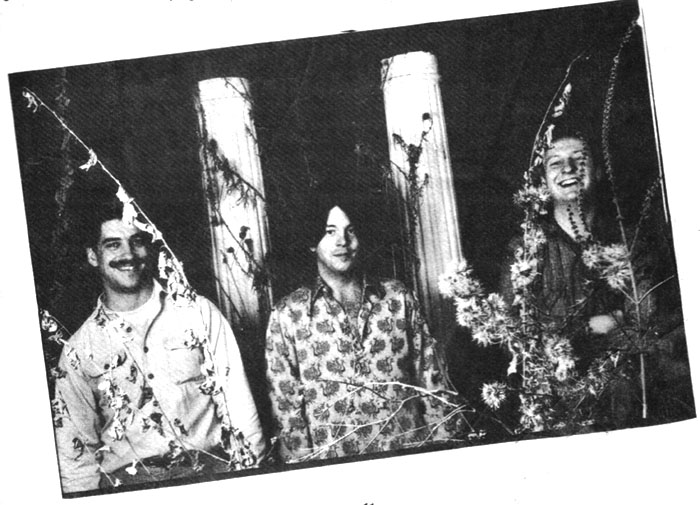
HUSKER DU'S
BOB MOULD
interview
by Kathy Landers
To interview a rock god or what you perceive as one can be an exciting although nerve-racking experience. I was given that chance on April 3, of this year. An interview with a man I consider to be the conscience of a generation without preaching, a man that makes one guitar sound like either a damn good whipping or a chorus of scathing angels. A band, a concept that can only be Bob Mould of Husker Du...
K: What was the first instrument you started to play?
B: One of those plastic electric organs when I was about 7 years old. Those were the ones with the magic chord buttons on them, on the left-hand side, the little round buttons. My parents gave it to me. As far as serious 'playing' music, when I was 16 I started playing guitar.
K: Did you have any ambitions to be a rock star at that time?
B: No, I never really thought about that. I knew, I guess in the back of my mind that I'd always end up in music, but I never really wanted to be a rock star. I was happy to be a musician.
K: Did you grow up in Minneapolis?
B: No, I grew up in Upstate New York. Farther north than Rochester.
K: When you started to play out, what was your first band?
B: Husker Du was the first real band for all of us. I mean we were in jam bands and all.
K: So you got together with Grant and Greg in 1979?
B: Yea, I met Grant in '78 at a record store, and had known Greg from another record store. It turned out that I played guitar, Grant played drums and Greg had a bass, so we just decided to start a band. Started writing songs right off the bat. We played our first show out in March 30th of 1979 - 8 years ago.
K: 8 years! - Has your life changed a lot, not just musically?
B: It's sort of strange growing up in front of people.
K: When you first started playing out what kind of clubs did you play??
B: Punk clubs. Places that would have bands that played original music.
K: So when did the "no stage diving" rule come into effect,
B: That started about two years ago when people really started getting hurt - playing venues that have higher stages. When your audience changes, not everybody wants to stage dive. Not everybody wants to be stage-doven on.
K: Did you guys ever get heavily into the punk scene in the late '70s?
B: We were so punk nobody could stand it.
K: Is that why you have a definite attitude, almost "anti-punk" - that you don't want to be "considered" one of a or any group?
B: When we started playing music in 1979 we did exactly what we wanted to do because we thought that was punk rock. Though it was the ability for anyone with any amount of talent to get up there and do something. As time went on, people wanted to categorize the
band as a hard-core band or a punk band or this or that or the other thing and every time someone tries to pin a label on the band they're wrong. You know, it only goes to show their frame of reference. What they consider the world to be, that's where they put us, Vis-a-vis, everything else in their life. And it's not so much a hard anti-punk stance, it's just hard anti-anything except what we do as musicians because we're not carrying anybody's flag.
K: You also don't want to be allied with any political organizations either?
B: That's not our time or place to get up there and tell people about politics. None of us are that well versed in the political system. I mean, I know what's going on right now but my opinions are not anymore valid because I'm a musician.
K: Let's talk now about labels you've been on - "EVERYTHING FALLS APART" was on REFLEX...
B: That's our own label - we started that label.
K: But "LAND SPEED RECORD" was your first album?
B: That was the first album. There was a single before that on REFLEX and then there was "LAND SPEED RECORD" on New Alliance, which was the Minutemen's label, Mike Watt's label.
K: Were you very close to D. Boon and the rest of the Minutemen?
B: Yeah, real close.
K: How did you end up on SST? Is that because of the Minutemen and Black Flag?
B: We had gotten to be acquaintances of Black Flag as well as the Minutemen and when we were recording "METAL CIRCUS" they offered
